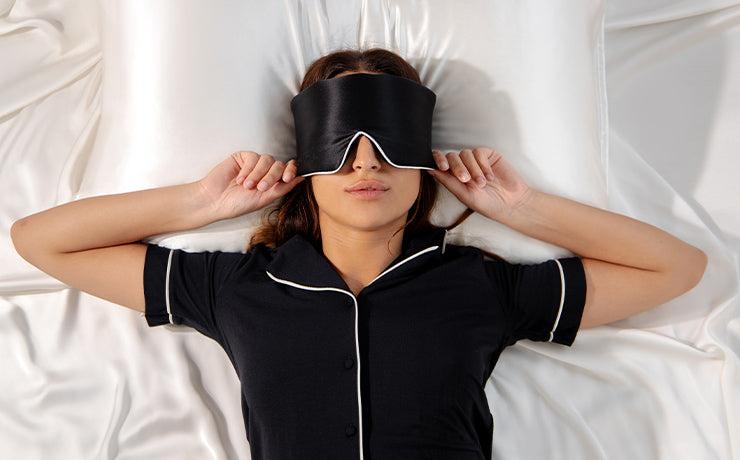Digestion & sleep: how your rest affects gut health
You know that feeling when you barely sleep and your stomach feels off? Not exactly painful, but weird. A little bloated, a little heavy, maybe even jumpy. Turns out, there's a reason for that, and it's not just what you had for dinner. Sleep and digestion are more connected than most of us realize. Mess with one, and the other tends to follow. The good news? It works both ways. Let's break it down.
Your gut and brain are in constant communication
There's this thing called the gut-brain axis. Sounds clinical, but it's basically a two-way chat between your digestive system and your nervous system. When you get enough sleep, that conversation runs smoothly. When you don't? The signal gets fuzzy.
You might feel more anxious, less regular (if you know what I mean), or just a bit "off." Part of this is because your gut microbiome (the collection of bacteria and microbes in your gut) helps regulate inflammation, hormone levels, and even mood. And yes, it's influenced by your sleep patterns and overall sleep quality.
Poor sleep throws your gut bacteria out of rhythm
We all have an internal body clock, but your gut bacteria kind of have one too. They're sensitive to when you sleep, eat, and even how much light you get. So, if you stay up late scrolling or crash at weird times? Your gut microbes can get confused. And that matters because:
-
You lose some of the "good" bacteria
-
Digestive health slows down
-
Inflammation can creep in
-
Nutrient absorption takes a hit
It doesn't all fall apart overnight, but over time, the imbalance can start to mess with more than just your digestion. Skin, energy, immune system, all of it's connected. Digestive disorders are often tied to poor sleep quality or inconsistent sleep duration.

A bad gut can mess with your sleep, too
Here's the twist. Your gut actually helps create some of the stuff you need to sleep. Things like:
-
Serotonin: helps regulate mood and turns into melatonin.
-
Melatonin: the hormone that tells your body, "Lights out".
-
GABA: calms your brain so you're not overthinking every weird conversation from the day.
So if your gut's out of whack? Those chemicals can drop. And suddenly, sleep feels harder. Staying asleep or waking up feeling like you got restful sleep can feel completely out of reach.
A few things make both digestion and sleep worse
It's not always just one thing. Sometimes, it's a mix of habits that sneak up on you.
-
Eating too late: You go to bed full, your body's still digesting, and next thing you know, you're staring at the ceiling.
-
Processed food overload: It might taste great, but your gut bacteria aren't fans.
-
Stress: The silent saboteur. It messes with sleep and digestion through cortisol spikes.
-
Inconsistent schedule: If you're going to bed at 10 one night and 2 a.m. the next, your gut doesn't know when to do its job.
It's not about perfection. Nobody eats clean 24/7 or sticks to the same sleep schedule forever. But if this stuff becomes a pattern, it adds up. And over time, these patterns can contribute to sleep disorders or conditions like gastroesophageal reflux disease. They can even worsen irritable bowel syndrome.
What helps? A few low-effort fixes
Okay, so the problem sounds big, but the fixes are surprisingly doable:
1. Eat and sleep on a rhythm
You don't have to live like a monk, but try to keep meals and sleep times roughly consistent. Your gut likes knowing what to expect, and so does your sleep-wake cycle.
2. Stop eating right before bed
Give yourself at least two hours between your last meal and lights out. That helps prevent things like excessive daytime sleepiness the next morning and gives your gut a break.
3. Eat more fiber and fermented foods
Yogurt, kefir, sauerkraut, lentils, berries. Your gut microbes feed on fiber and love a good probiotic.
4. Calm down before bed
Easier said than done, sure. But seriously, even ten minutes of reading, journaling, or breathing exercises can lower cortisol and ease you into healthy sleep.
5. Block the light
Even tiny amounts of light can mess with melatonin production. A Drowsy sleep mask can block out light and external stimuli, flipping the "do not disturb" sign on your face.
6. Think about your supplements
Some sleep aids support your gut and nervous system without knocking you out. Look for ones that include ingredients like magnesium, L-theanine, or gentle adaptogens (Drowsy's got a few good options.)

Some things to skip, if you can
A few things are worth avoiding, especially in the evening:
-
Caffeine after mid-afternoon
-
Spicy, heavy, or greasy food at night
-
Alcohol close to bedtime (yep, even that one glass of wine)
-
Lying down right after dinner
All of these can worsen both obstructive sleep apnea symptoms and trigger digestive disorders. If any of that's a regular thing, try pulling back just a little. See how your sleep feels.
The gut-sleep loop is real
Sleep deprivation doesn't just make you tired; it affects how your whole body works, including your gut. It's a loop. And while it might sound complicated, it's actually a good thing, because improving one usually helps the other.
So no, you don't need to micromanage every bite or sleep with a tracking ring on. Just be a little more intentional. Give your gut a chance to catch up. And let your sleep do what it's supposed to.
And if you're trying to sleep deeper, fall asleep faster, or just give your body a break, Drowsy can help. From our silk sleep masks to our beauty sleep clinic supplements, everything we make is designed to support real, restful sleep and nourish your body.






